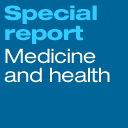 |
|
| ||||||||||||||||||||||||||||||||||||||||||||||||||||||||||||||||||||||||||||||||||||||||||||||||||||||||||||||||||||||||||||||||
 |
|
| ||||||||||||||||||||||||||||||||||||||||||||||||||||||||||||||||||||||||||||||||||||||||||||||||||||||||||||||||||||||||||||||||

|
'It said the drug was the best
thing since sliced bread. I don't think it is' Sarah Boseley Thursday February 7, 2002 The Guardian David Healy, director of the north Wales department of psychological medicine, was approached by a communications agency working for Pierre Fabre, makers of the antidepressant milnacipran. They invited him to speak at a company-sponsored symposium on the new drug at a European College of Neuropsychopharmacology meeting in September 1999 and produce a paper from his talk. The papers were to be published in a supplement to the International Journal of Psychiatry in Clinical Practice, which is edited by Siegfried Kasper and David Baldwin. "In order to reduce your workload to a minimum we have had our ghostwriters produce a first draft based on your published work," the email from the company said. The draft was based on Dr Healy's past work and included references to his papers, but he preferred to write his own article and submitted that to the agency. The agency's response, a month later, was that it would be a pity to alter Dr Healy's own article but that they needed "to bring across one or two points that are not accentuated in your manuscript." They had decided, they said, to publish Dr Healy's article separately in the supplement. But the original, ghostwritten article which contained what they described as "the main commercially important points" was to be there too. "Siegfried Kasper has kindly agreed to author this one," they said. The name of Professor Kasper of the University of Vienna, editor of the journal, duly appeared on the unaltered, published article, complete with the original references to Dr Healy's work. Professor Kasper told the Guardian that he was happy with the content of the article. A second approach was made to Dr Healy by a senior academic at the Centre for Addiction and Mental Health at the University of Toronto. Dr Healy was invited to speak at a symposium and author a paper on an antidepressant called venlafaxine, made by Wyeth. In the past few years, it has been recognised within psychiatry that while "wonder drugs" like Prozac take the edge off depression, they do not bring about a cure. Wyeth claims that venlafaxine can. On January 1 2001, Dr Healy and his colleague Richard Tranter were sent an email containing "the first draft of your article by a medical writer from an agency which was organising the supplement which would follow Wyeth's symposium. They were invited to "feel free to edit it in any way you choose." Dr Healy and Dr Tranter made some changes, pointing out that studies of a similar drug called mirtazapine did not support the message Wyeth wanted to give and that other studies showed that antidepressants could make some people worse, even suicidal. In June, when the finished manuscript arrived in the post, it had been, says Dr Healy, "significantly altered". And a sentence had been added, saying that venlafaxine "may induce full remission in a greater number of patients". Dr Healy took strong exception to this statement. "That last sentence said that Wyeth's drug was the best thing since sliced bread," said Dr Healy. "I would never have said that because I don't think it is." He found that the pro-Wyeth line had been inserted by the senior academic in Toronto who had helped set up the symposium for Wyeth. Dr Healy removed his name from the article. Special reports Aids Anthrax BSE crisis Medicine and health Smoking Interactive guides Cloning Smoking Useful links Aids.org Ash (anti-smoking site) British Medical Association Department of Health General Medical Council Health on the Net Foundation Institute of Cancer Research Medical Research Council NHS Direct World Health Organisation Printable version | Send it to a friend | Save story | |||||||||||
 |
 |